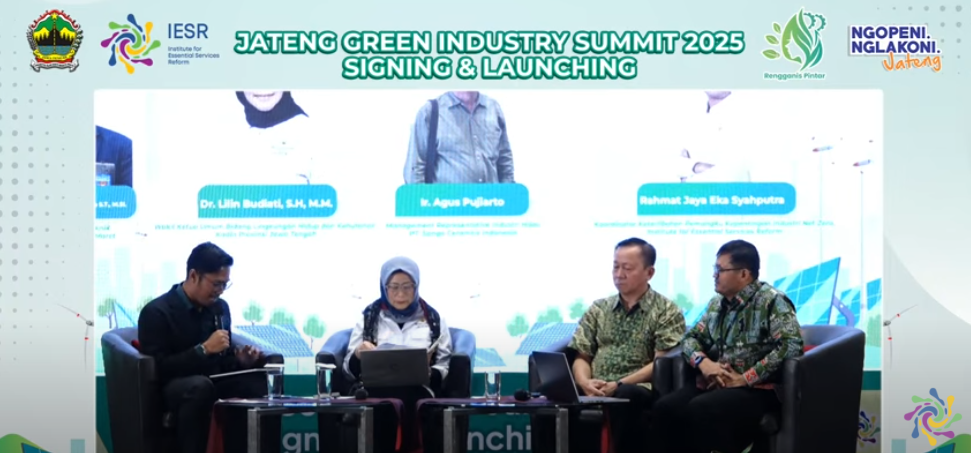Semarang, September 19, 2025 – Central Java, with its large population and rapidly growing industrial sector, is feeling the direct impact of the climate crisis. Rising global temperatures, changing rainfall patterns, and natural disasters such as floods and droughts are beginning to disrupt livelihoods. Industries that rely on fossil fuels and environmentally unfriendly production processes are exacerbating the situation by increasing greenhouse gas (GHG) emissions.
As one of Indonesia’s main industrial provinces, Central Java needs to promote sustainable industry. Lilin Budiati, Deputy Chairwoman for Environment and Forestry at the Central Java Provincial Chamber of Commerce and Industry, explained that several business practices that support sustainability, such as the use of renewable energy, environmentally friendly waste management, and the production of goods using green technology, have begun to be implemented in various sectors.
“To promote sustainable industry in Central Java, five steps need to be taken. First, a clear and sustainable vision is essential in building environmentally friendly industries and businesses. Second, close cooperation between the government, the private sector, and the community is necessary to encourage investment in environmentally friendly technology. Third, the adoption of circular economy principles in industrial practices is key to reducing waste and improving resource efficiency,” said Lilin at the 2025 Central Java Green Industry Summit: Green Industry as a Pillar of Energy Transition and Low-Carbon Development, organized by the Institute for Essential Services Reform (IESR) together with the Central Java Provincial Government on Thursday (9/18).
Furthermore, Lilin stated that the fourth step to realizing a green industry is innovation in renewable energy technology. Next, empowering communities and local stakeholders in sustainable economic and industrial activities is very important. Training, education, and capacity building programs for communities will open up new job opportunities and raise awareness about the importance of sustainability in everyday life.
Wahyudi Sutopo, Dean of the Faculty of Engineering at Surakarta State University (UNS), said that efforts to produce a workforce that is competent in environmentally friendly technology are very important to achieve sustainable development. One of the initiatives that is being intensified is to produce a workforce that not only has technical expertise but also understands the importance of energy transition and efficient natural resource management.
“In the first stage, called Knowledge Externalization, the main focus is to analyze gaps in green transformation and provide knowledge-based solutions that can be directly applied in the industrial world. This involves incorporating in-depth research into the learning process, as well as developing a curriculum that integrates knowledge related to green technology into courses,” said Wahyudi.
For the second stage, Wahyudi continued, called Academic Immersion, the knowledge gained from the first stage is applied in industry through various initiatives such as internships, research work, and collaboration with industrial companies. Here, students and graduates will be directly involved in the green industry ecosystem through activities such as independent internships and various research projects.
“Universities also play a role in introducing new concepts regarding green talent needed by the green industry. At this stage, academia not only serves to produce knowledge but also contributes directly to the development of a workforce capable of facing the challenges of energy transition and climate change,” said Wahyudi.
To realize this vision, Wahyudi said that one of the main strategies is to create an impactful campus that integrates an OBE (Outcome-Based Education) curriculum. By prioritizing experiential learning, students not only gain knowledge but also develop the soft skills needed to work in the green industry sector.
Meanwhile, Agus Pujiarto, Green Industry Management Representative at PT. Sango Ceramics Indonesia, said that currently, the industry is faced with the challenge of becoming more efficient and effective. The main problem faced by the business world is how to produce large outputs with smaller capital. Therefore, it is important for universities to produce workers who are able to overcome these challenges, especially in the green industry that focuses on sustainability and reducing environmental impact.

